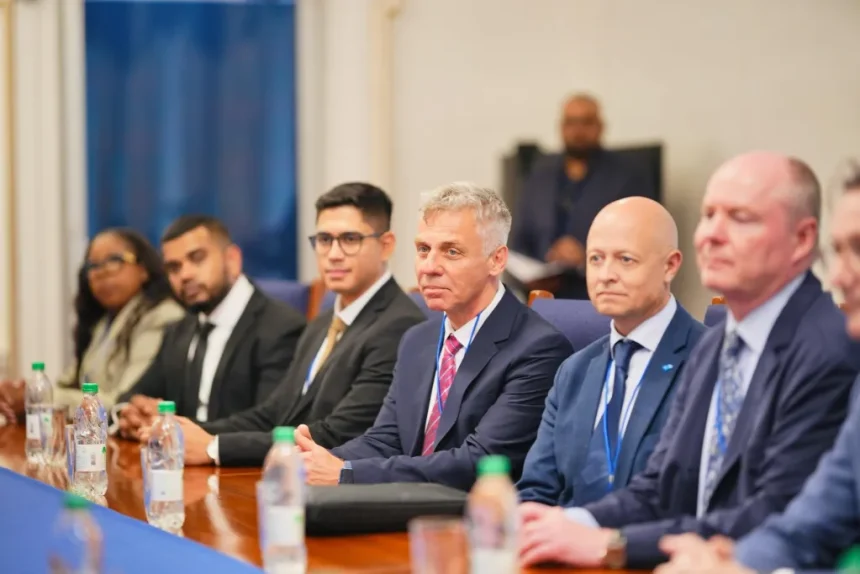The Health Ministry in collaboration with the European Chamber of Commerce on Monday launched the European Union’s (EU) Global Gateway Investment Mission in the Health and Pharma Sectors at the Marriott Hotel, Georgetown.
The mission, which will run from June 2 to 4 under the EU’s Global Gateway Initiative, is aimed at enhancing collaboration between European health and pharmaceutical companies and Guyanese stakeholders to support the development of the country’s healthcare sector.
Delivering the feature address at the opening ceremony was Health Minister Dr Frank Anthony who spoke about the goal of establishing Guyana as the pharmaceutical hub of the Caribbean region. This goal, he noted, is as a result of Guyana and other small developing countries finding it difficult to access medication and vaccines from existing manufacturers.“And so we’ve had discussions with the EU, and out of those discussions, there was an agreement that was signed by the President of the EU, along with our President and of course, the Prime Minister of Barbados, that allowed or catalysed this whole movement of trying to develop the manufacturing capacity here in the Caribbean the two leading countries in this initiative is obviously Guyana and Barbados.”
The EU, Dr Anthony further noted, has played an instrumental role in strengthening the resilience of the medical sector within small and developing countries.
In fact, the trade mission currently taking place will host more than 13 companies from EU member states, such as the Spain, Austria, France, Czech Republic, Portugal, Sweden, Italy and Ireland.
Over the course of three days, the event will include sector-focused seminars, business-to-business (B2B) meetings, and organised visits to medical and pharmaceutical facilities in Guyana to facilitate collaboration and knowledge sharing, supporting Guyana’s vision of becoming a regional leader in health innovation and pharmaceutical manufacturing.Moreover, as Guyana pushes to become a pharmaceutical hub in the region the Health Minister also stressed the importance of having strong regulatory bodies to ensure manufactured products meet international standards.
Travel guide
“We also recognise that if we are going to be working on manufacturing pharmaceuticals, then we would like to be able to monitor the companies who are manufacturing, and when our regulatory agency put a stamp of approval that it would meet the finest standards in the EU. But for us to do that, we wanted to have that experience, work with an EU country that knows how to do this regulation, look at the legal framework, look at all the regulations that are needed, and to help us to implement that in Guyana.”
“So, we have done an assessment of our regulatory agency, and our laws, when we looked at them, they date back from 1974, which is pretty old. And we have worked with our partners, including the Pan American Health Organisation (PAHO) and we now have drafted new laws for the pharmaceutical industry.”
In addition, the Government of Guyana is actively modernising its Food and Drug Department regulations to streamline processes, encourage pharmaceutical investment, and foster a more business-friendly environment for industry stakeholders.
Meanwhile, also present at the event was the EU’s Ambassador to Guyana René Van Nes who highlighted the important role the investment mission will play as the country develops its pharmaceutical industry.
Travel guide
“So as Guyana is shaping its future of healthcare and pharmaceuticals, we can all be part of this. I think that is the objective of today. And I have no doubt that the connections that you will make today will have a lasting impact on this phenomenal trajectory so I look forward to the discussions that you will have, the collaborations, the contacts that you will build and that from this vision we will see companies taking forward the opportunities that Guyana has to offer.”
Launched in 2022 by Guyana, Barbados, and Rwanda, the Pharmaceutical Equity for Global Public Health initiative aims to ensure equitable access to essential medicines and vaccines by strengthening local production and reducing dependence on external supply chains. With support from the EU, this initiative promotes regulatory cooperation, technology transfer, and strategic partnerships to build sustainable pharmaceutical manufacturing capacity.
This mission aligns with the EU’s Global Gateway strategy, which aims to foster sustainable and secure global partnerships, with a particular focus on critical sectors such as healthcare. Investing in Guyana—a rising force within the Caribbean Forum (CARIFORUM)—represents a strategic opportunity for the European private sector. The EU is already CARIFORUM’s third-largest trading partner overall, after the United States US).
Travel guide
Under the Economic Partnership Agreement (EPA), CARIFORUM countries benefit from immediate duty-free and quota-free access to the EU market for all products, with certain exceptions for sensitive goods. In return, CARIFORUM nations have committed to gradually liberalising their own markets over a 25-year period. For Guyana, the EPA presents substantial opportunities in the health sector.
The duty-free access to the EU market facilitates the import of essential health products and medical equipment, which can play a crucial role in enhancing the country’s healthcare infrastructure.










